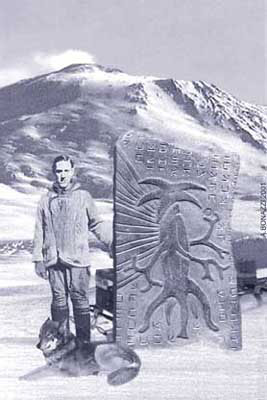We are developing the social individualist meta-context for the future. From the very serious to the extremely frivolous... lets see what is on the mind of the Samizdata people.
Samizdata, derived from Samizdat /n. - a system of clandestine publication of banned literature in the USSR [Russ.,= self-publishing house]
|
John McGuinness chides NRO’s blog The Corner for their disinclination to link to articles they reference.
I’m enjoying National Review’s new Blog — The Corner, but one complaint is that they don’t seem to be as diligent in linking to articles they’re referring to as most bloggers are. So it’s not always easy to tell if they’re representing opposing viewpoints fairly.
John makes a very good point. I also groused about that and why it is actually counter-productive in an earlier article. I suspect the NRO team are so steeped in old-media-think that it just does not seem ‘right’ to link to people they incorrectly view as competitors. Well the fact is that links are what makes the blogosphere and the very internet itself go around and they are a resource in themselves… and like unilateral free trade, which works even if the idiots in other nations are protectionists… I will continue to link to Corner if I quote them (and they are also in the blog side bar) because it is in my interests to do so for both the reasons I mentioned in my earlier article on the subject “Jonah Goldberg comments on the joys of group sex“, and also for the valid reason John McGuinness gives: it actually boosts credibility to be able to check the facts yourself.
So guys, what are you afraid of?
At least the ones which are not so alarming that I do not want to show them!
via google.com: retirement+party+funny+pictures+slide+presentation
via google.com: james+c.+bennett+islamic+fundamentalism
via alltheweb.com: email+addresses+of+arab+leaders
via google.com: false+mustache+makeup
via alltheweb.com: japanese+cheerleaders
via google.yahoo.com: spanking+kylie
via google.com: world+grid+gamma+rays+human+brain huh?
via google.com: enron+baxter+suicide+conspiracy
via alltheweb.com: clandestine+ladies
via google.yahoo.com: Turner+Prize+judges
via google.com: dark+side+ayn+psychopathy
via search.lycos.com: I+ain’t+afraid+of+bugs oooooookay!
via suche.lycos.de: dripping+lips
via google.com: cuba+kennsington
via google.com: bush+choked+on+pretzel+buddy+clinton
For me it is like walking through some exhilarating global weather system, an interactive one at that. I see some article that does not particularly interest me and it is like a raindrop against my skin or a passing breeze: I am aware of it but in a moment it is gone and forgotten.
And then I see something that interests me, like light from some distant sun touching my face through the shifting clouds of data. Or then suddenly I stumble upon something that angers or startles me, like a lightning bolt hurtled up into the sky from New York or Wellington or Belgrade or Delhi or London, only to strike the ground near me, illuminating everything for a moment and shocking me with its force.
The Internet makes me feel like I am some luminous being working a magic device that transports me up from my little corner of the Balkans until I can not only look down over the sound and fury of the whole world, but like some pagan goddess with my shimmering wings powered by Blogger.com, fling my own thunderbolts back down at it, watching them strike in London and Warsaw and Calgary and Athens and Pretoria.
The Internet is so much more than the slow moving dead text of yesterday, something remote from yourself held at arms length figuratively and literally. It is the seething, howling, singing, snarling voice of the global gestalt that surges through you and carries the sound of your own voice away with it to unseen ears on the other side of the world. It is utterly intoxicating.
My experience is quite different from Brian’s. For me the Internet has “always been there”. I had access to its earliest form when I was a grad student at CMU in the early 70’s. Although I became a card-carrying Libertarian during a time when I lacked access to the university computers, that soon changed. I’ve been continuously on the internet from 1983, and a researcher who digs hard enough will find my very libertarian oriented Space Digest postings from that period.
This brings me to a point it has long been my intention to make. Blogs did not come out of a vacuum. Many writers like myself have been debating, arguing and posting for two decades. That’s a lot of practice. We’re not people who sat down one day and said “Oh, I think I’ll start writing about current affairs”. Some of us have been writing for every bit as long as the “mainstream” journalists. Our editors were not our bosses but our peers; they gave us the harsh critique of people who knew the facts and were unafraid to let you know it. You also learned to withstand attacks that could be harsh and personal. Libel? Hah! You just returned fire. Courts were for wimps!
I do understand a little of what Brian says, because I can remember a time when I could say I knew all of the key people on the internet. That is certainly no longer true. I feel honoured to have been in the circles of those early days and that ring of acquaintances is one I still find valuable to me professionally and otherwise.
If there are journalists reading this who have spent their working lives in the traditional print media, the blog phenomena must be quite disconcerting. It seemingly appeared from nowhere around September 11th. Things do happen fast on the net, but I assure you many of us have been writing for as long as yourselves. The format has been different, the rules have been different, but we are really quite as experienced (and blooded) in our media as you in yours.
Back to Brian’s Lament (sounds like an Irish trad song title, don’t it?)… we each add our small contribution. Being the most read or the top rated isn’t what matters. The Internet is our home and its residents are our friends and neighbours. It takes a bit of getting used to, this non-territorial territory we live in, a “place” where your neighbors may be physically anywhere that humanity is to be found and proximity is defined by shared interests and values rather than place.
But it’s a good place and it is where the history of this century will be written.
I note a state of mind which I have detected in myself, and wonder if any others share it?
Once Upon A Time, I was a happy libertarian. I knew only about a dozen other libertarians at all well and I was one of the cleverest and most dedicatedly productive of them. The rest of my little world consisted of the Great Unenlightened, the Statist Masses, all of whom I outranked. I knew of other libertarians, in far away countries of which I knew little such as America, but they didn’t loom large in my mind. Occasionally they sent us little bits of writing through the post, but nothing impressive enough to threaten my sense of my own libertarian magnificence. I and my little gang of friends, we few, we happy few, were shining the torch of liberty in little England. I thrashed out Libertarian Alliance pamphlets, secure in my own libertarian splendour. I was a Big Fish in a Small Pond.
Then came the Internet. Suddenly I am becoming acquainted on a daily basis with the clever – often very clever – thoughts of as many dozen libertarians as I can make myself attend to. Worse, Little England no longer needs me to tell it about libertarianism, for it too can plug into the great Magic Filing Cabinet in the Sky, the Great Conversation Machine. In such a world, does my little voice, my little computer keyboard, count for anything? What do my Libertarian Alliance pamphlets signify, when set beside the thousands upon thousands of other libertarian writings out there? I still crank out Libertarian Alliance pamphlets, because it’s what I do. It’s what I am. But what I now am is a Small Fish in a Big Pond. I feel melancholy.
This experience is not confined to libertarians. I am suffering from a universal syndrome caused by better global electronic communications. (I’ve even read a book about this, by, I think, someone called Oliver James.)
Because of daily TV broadcasts of the best club and international football matches in the world (which he knows others are watching even if he can’t bear to watch such things himself), a man who was happy when thinking of himself as the second best footballer in Doncaster, is now forced to contemplate the fact that he is the 9,673rd best footballer in the world – a depressing demotion indeed. Ditto in every other area of human endeavour.
It sounds to me as if most of my fellow bloggists here at Samizdata found their first voices, so to speak, as contributors to the Great Global Conversation, and are making steady, satisfying progress up the relevant, if huge, pecking order. “Last week I was the 934th best libertarian” (or however exactly they classify themselves). “Now I’m the 919th best. Next year, if I keep it up, I’ll make it below 900”, etc. I’m talking subjective experience here and my guess numbers are just that, pure guesses. I am aware of no rating system for libertarian writers and activists of this kind, of the sort which now says that Sachin Tendulkar of India – for I think it is he – is the now the best test match (i.e. international cricket) batsman in the world (thereby depressing all other batsmen everywhere). Thus, the other bloggists do not feel melancholy. But then again, maybe if you are starting out at the bottom of the global libertarian pecking order, the prospect of that long trudge from 900 to a probably peak of, I don’t know, about 300, and then back down to 1,000 followed by oblivion, depresses them too.
Serious confessions of unhappiness are not cool, coming from libertarians, and especially not if the cause of the unhappiness is something so triumphantly capitalist as modern electronic communications. Trivial snarlings about the annoyances of the latest version of Windows or non-trivial snarlings about politicians and their many misdeeds, yes, fine. But confessions like this one cross some kind of line.
Which of course is why I choose to write thus. Good writers regularly cross such lines, and I’m still bashing on, trying to write well. So don’t worry everyone, everyone who cares that is to say. My confession is serious, but the unhappiness I confess to is not overwhelmingly serious. I’m not talking suicide here. I’ll soldier on, and all the better if this piece of confessional therapy does its job and helps to reconcile me to my new (small) place in my new (big) world.
But, does anyone else out there know what I’m talking about?
The dependably interesting John Weidner at Random Jottings has a wonderful article on the daddy of all bloggers.
[He] was a lousy writer. At least when he wrote books and articles. His books are cranky hotch-potches; formless and almost unreadable. He was very combative; he was at his best in the quick give-and-take of argument, and was very successful as a lawyer. But he rarely took the time to organize his (often excellent) ideas into reasoned discourses.
However, unknown to the world, he spent much effort writing in a different style. He owned the best library in North America, and the books he read most often were those whose arguments he hated! He would fill the margins of those books with comments and refutations. He would tear them apart line by line. Does this sound familiar?
If you want to know who this mystery proto-blogger was, you will just have to go take a look at John’s article.
But certainly not a site for the weak! The curiously named Rantburg is a tightly focused geopolitical warblog with a robustly anti-idiotarian view of things. I do not always agree with Fred Pruitt’s particular spin, though I frequently do, but it is nevertheless a good and and often quite detailed read. He has a fine grasp of the regional players about which he writes (unlike a few blogs I could mention) and he understand real-world political dynamics (unlike a few other blogs I could mention).
Visit daily.
Over on National Review On-line, sometimes inspired and sometimes confused Jonah Goldberg describes the new NRO blog Corner for those unfamiliar with the format:
For those of you who don’t “get it,” here’s what it’s about. Various NR editors and members of our extended family get to comment on anything we like, including each other’s comments. We try to keep the posts short and the most recent appear on top.
There are no editors, no rules, and no master plan. Yes, as many, many, many readers have pointed out, it’s very much like a blog along the lines of AndrewSullivan.com or Instapundit.com. The difference, however, is significant. Those guys run one-man operations. If you can’t see the distinction, look at it this way. Sex with one person is very different than sex with more than one.
Someone needs to spank that boy with a rolled up copy of National Review and set him straight on a few things: Firstly “Corner” is not “very much like a blog”… it is a blog. Secondly, it is bad form not to link to Andrew Sullivan and Instapundit if you are going to mention them. We are not competitors, Jonah, we are actually a resource for each other and “Corner” is no different. Unlike dead tree media, which is chasing the same dollar, cross links actually feed readers at the people we comment on and visa versa. In fact, the more of us there are and the more cross links there are, the more readers we all get by virtue of the increased content and broader catchment… people who might not be seen dead with a copy of NR or ever think of typing www.nationalreview.com (i.e. quite a few libertarians) might nevertheless follow a link they find here to NRO just to see what we are talking about, which is surely what NRO would want.
Bitching aside, “Corner” is actually quite a fun blog. We are glad they liked our multi-contributor format so much that they copied it. It is even nicer to know that when Jonah thinks about blogs, he thinks about sex. I’d like to think we can take credit for that too.
We are of course well aware that the cognoscenti like Jonah only come to Samizdata for Natalija’s “go for the throat” articles.
This picture of me was taken by a famous Italian archeologist a few years ago whilst we were off on a little ‘expedition’ to gather up a few bits and bobs in some out of the way places.
And to think some clown from the Third World part of the blogosphere thought I might look like “God as portrayed in Monty Python And The Holy Grail”. Pffff.
I have a slightly sore throat so I am drinking what I always drink at such times. Take one large mug into which put:
· Fresh squeezed juice of one medium lemon
· One large teaspoon of English heather honey
· One hefty shot of Kentucky bourbon (Bulleit Bourbon)
· Fill with boiling water
· Stir
· Drink
But what makes this unusual tonight is the large mug in question, for on the side it says: I’m a BITTER Princess. www.bitter-girl.com
And the bitter Princess in question can be found here. She may be bitter, but she is also rather splendid in my not so humble opinion.
Manly philosopher Will Wilkinson over on The Fly Bottle has posted a picture of himself getting in touch with his, um, feminine side.
Three of Samizdata’s intermittent guest contributors are revealed (but not reviled)
 The sinister Andrew Dodge of Dodgeblog infamy.

The mysterious Lagwolf

The ubiquitous Mommabear
|
Who Are We? The Samizdata people are a bunch of sinister and heavily armed globalist illuminati who seek to infect the entire world with the values of personal liberty and several property. Amongst our many crimes is a sense of humour and the intermittent use of British spelling.
We are also a varied group made up of social individualists, classical liberals, whigs, libertarians, extropians, futurists, ‘Porcupines’, Karl Popper fetishists, recovering neo-conservatives, crazed Ayn Rand worshipers, over-caffeinated Virginia Postrel devotees, witty Frédéric Bastiat wannabes, cypherpunks, minarchists, kritarchists and wild-eyed anarcho-capitalists from Britain, North America, Australia and Europe.
|








